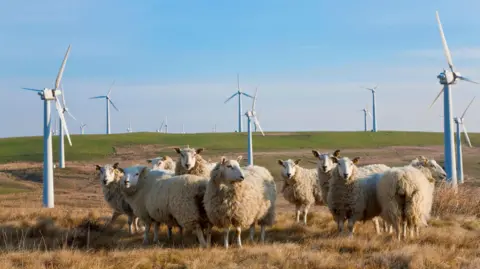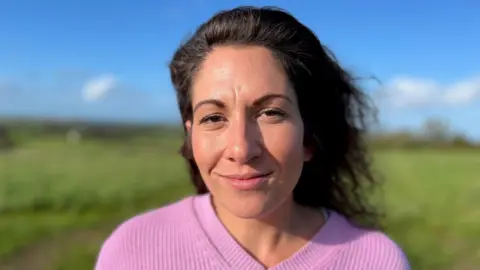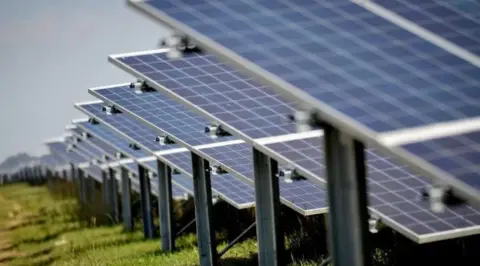Is Wales falling behind in clean power race?
 Getty Images
Getty ImagesWales risks falling behind the rest of the UK in the race to meet clean power targets, an industry body has warned.
RenewableUK Cymru believes a lack of electricity grid capacity makes it hard for projects to get off the ground, while there are severe delays in the decision-making process.
It wants a "four nations renewables team" to ensure Wales does not miss out on opportunities from the UK government’s GB Energy initiative.
The Welsh government said the first minister "has placed green jobs and growth at the very top of the agenda".
RenewableUK Cymru wants "urgent action" to speed things up, after decisions on three wind farms – capable of powering 170,000 households annually - were delayed.
It said one at Garn Fach, Powys, has been awaiting approval for more than two years.
The UK government wants to double onshore wind, triple solar power and quadruple offshore wind by 2030, and for all electricity to come from zero-carbon generation by 2035.
Most decisions on projects in Wales rest with the Welsh government.
RenewableUK Cymru Director Jess Hooper said: "We want projects to invest here, to train and employ local people, build thriving supply chains, and bring widespread benefits to communities and nature restoration initiatives.
"Delays send the wrong message, suggesting Wales is not an attractive place for development.
"Without timely action there is a real risk that Wales will miss this investment opportunity and fall behind in the UK’s race to meet the 2030 clean power target."
A Welsh government spokesperson said it would support a collaborative approach across the UK for "renewable energy opportunities".
However, they added that green jobs and growth were at the very top of the agenda for delivery in Wales - with energy, economy and planning all in the same department to make sure projects are considered as a matter of urgency.

But not everyone is keen on more wind and solar farms.
From her home in Rhosgoch, Anglesey, mother-of-two Sarah Pye, 36, can already see the Wylfa nuclear power station, large wind turbines and fields of solar panels.
Her view could soon be changed far more.
As well as a solar development, there is Lightsource BP's Maen Hir proposal - which would be the size of 1,700 football pitches.
The 350MW development would power more than 130,000 homes, and be almost five times bigger than the UK’s current largest active solar farm.
"Honestly, it breaks my heart, breaks my soul," Sarah said.
"It makes me want to cry."
She compared it to the flooding of the village of Capel Celyn in Gwynedd in the 1960s to create a reservoir.
"I think it’s round two of 'Cofiwch Dryweryn' [a campaign slogan against this], and people being forced out of their homes," she said.
"But this is actually on a larger scale."
Sarah is also concerned about the potential impact on Anglesey’s agricultural and tourism industries.
"We’re the mother of Wales. We feed Wales," she added.
"What about food security, is that not important as well?
"We need food security and renewable energy, but where’s the balance?"
Lightsource BP said there would be no compulsory purchase of residential buildings and "no-one will be required to leave their homes".
It added that the company is "committed to developing a project that co-exists with ongoing farming activities, as well as boosting local biodiversity", and urged people to engage with a statutory consultation which is under way.

The UK’s largest power generator, RWE, runs an apprenticeship programme for wind turbine technicians in Rhyl, Denbighshire.
Grace Dennehy, 17, is confident there will be enough job opportunities, but said decisions on developments should move faster.
"My concern is that I think we should be working at a faster pace to grow the industry, because obviously it is important for our world to be a greener place… and for that to happen we’re going to need the production of the wind farms to speed up," she said.
Hollie Massey, 17, added: "There’s always going to be a future in renewables so I know I’m not going to run out of choices."
 PA Media
PA MediaKey to meeting renewables targets will be the UK government’s flagship GB Energy.
In opposition, UK Labour claimed its Green Prosperity Plan would "lead to more than 29,000 jobs in Wales" and GB Energy would build more than 1,000 local power projects.
But many in the industry still do not know exactly what GB Energy means for Wales.
Marine Energy Wales agrees the country “runs the risk of getting left behind without change when it comes to floating offshore wind (FLOW)", and it hopes GB Energy will "accelerate the industry".
It wants to see how "Wales slots into their vision," adding: "Scotland is excelling when it comes to FLOW and with GB Energy being headquartered there, we want to ensure Wales isn’t forgotten."
The Campaign for the Protection of Rural Wales, believes onshore wind is "dreadful" for the countryside, and wants GB Energy to focus on "offshore wind in both the Celtic and Irish Seas".
Welsh Secretary Jo Stevens said Wales would “play a huge role in what GB Energy is going to do", and said a new partnership between the company and the Crown Estate would pave the way to attracting private investment to establish floating offshore wind.
“We're making steps towards it, the bidding rounds are going through,” she said.
"We've got to make sure all the conditions are there but this government is absolutely determined that we hit our clean power targets by 2030 and floating offshore wind in the Celtic Sea is going to play a valuable part in that."
